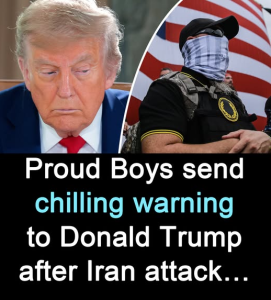Proud Boys Warn Trump: Support Could Crumble If He Engages in Iran War
In a surprising twist that underscores growing fractures within parts of Donald Trump’s base, the Proud Boys — the far-right group that once fervently championed the former president — have issued a stark warning: if Trump moves the United States into a full-scale war with Iran, they will withdraw their support. The declaration has sent shockwaves through both political and security circles, highlighting how foreign policy decisions can fracture domestic alliances in unpredictable ways.
The Proud Boys’ Position
The Proud Boys, who gained national prominence during Trump’s presidency, have long positioned themselves as staunch defenders of what they call “America First” values — opposing what they see as endless foreign entanglements and wars that drain U.S. resources and cost American lives. While the group has often aligned itself with Trump’s rhetoric on immigration, nationalism, and law and order, they’ve also been vocal in their opposition to foreign military interventions.
In a statement circulated on social media and in private message channels, a leading spokesperson for the Proud Boys said:
“We backed Trump because he promised to end the forever wars and put Americans first. A war with Iran is a betrayal of that promise. If he starts this war, he loses us. Period.”
The statement went on to accuse Trump of being at risk of falling into the same “deep state trap” they believe ensnared previous presidents, dragging the nation into costly conflicts overseas.
Growing Tensions Over Iran
Trump’s administration and post-presidency influence have been marked by a complicated relationship with Iran. From withdrawing the U.S. from the 2015 nuclear deal to implementing a campaign of “maximum pressure” through sanctions, Trump’s approach to Iran has often been combative. Now, as reports of escalating military strikes and potential troop deployments to the Middle East dominate headlines, Trump’s stance is drawing both praise and criticism — sometimes from unexpected quarters.
For the Proud Boys and similar groups, the risk of another prolonged military campaign is a red line. Many within these circles view intervention in Iran not only as a foreign policy blunder but as a betrayal of the nationalist, anti-globalist principles they feel Trump once represented.
Fractures in the Base
Trump’s political base has long been a complex coalition of traditional conservatives, evangelical Christians, libertarians, and various populist factions, including groups like the Proud Boys. While united by their support for Trump’s domestic policies, these factions often diverge sharply on foreign policy. For years, Trump’s rhetoric of avoiding “stupid wars” helped bridge these divides. But the prospect of conflict with Iran threatens to break that uneasy peace.
A senior analyst at a Washington think tank observed:
“Trump walked a fine line — projecting strength while avoiding direct military confrontation. A war with Iran could unravel the coalition that helped propel him to the presidency and sustain his political movement.”
The analyst added that groups like the Proud Boys, while controversial and often condemned for their extremist views and violent actions, represent a vocal slice of Trump’s populist supporters. Losing them could damage his image as the leader of an anti-establishment movement.
The Broader Political Implications
The Proud Boys’ warning also reflects broader concerns among many Americans weary of war. Polls consistently show that a majority of the U.S. public prefers diplomacy over military action when dealing with Iran. Even some conservative commentators have joined in cautioning against escalation, warning that it could backfire politically and strategically.
Should Trump choose to engage militarily with Iran, he could face not only a split within his base but also intensified criticism from political opponents eager to paint him as hypocritical or reckless. The Democrats, already vocal in condemning Trump’s foreign policy during his term in office, would likely seize on the opportunity to highlight what they see as a betrayal of his promises to end wars.
Trump’s Dilemma
Trump now finds himself in a delicate position. On one hand, he has long cultivated an image of toughness, portraying himself as someone who would never back down from America’s enemies. On the other hand, he has repeatedly boasted of keeping the nation out of new wars, a claim that resonates strongly with his populist supporters.
If Trump proceeds with military action against Iran, he risks alienating a portion of his most loyal backers — not just the Proud Boys, but others who share their non-interventionist stance. If he holds back, he could be accused by hawks of weakness or indecision at a moment of international crisis.
A Fractured Movement?
The Proud Boys’ statement may foreshadow a broader reckoning within the populist right. For years, opposition to endless wars has been one of the few issues uniting nationalist, libertarian, and anti-globalist factions. A war with Iran could shatter that fragile unity, leaving Trump vulnerable to challenges from within his own movement.
Already, some smaller right-wing figures and influencers are beginning to signal their unease. Online forums and social media platforms popular with Trump’s base are filled with heated debates over the wisdom of military action. Some users accuse Trump of selling out, while others argue that America’s security must come first, even if that means war.
What Comes Next?
For now, Trump and his advisers appear to be weighing their options carefully. Reports suggest that behind closed doors, there are fierce debates over how far to escalate tensions with Iran. Meanwhile, the Proud Boys’ warning serves as a reminder that even Trump’s most ardent supporters have limits — and that foreign policy choices can have domestic consequences far beyond Washington’s corridors of power.
In the coming days and weeks, Trump’s decisions on Iran will not only shape the future of U.S. foreign policy but may also determine the fate of the coalition that helped define his political rise. The Proud Boys’ message is clear: the path to war with Iran is, in their view, the path to losing their support — and perhaps the loyalty of others who once chanted his name.

